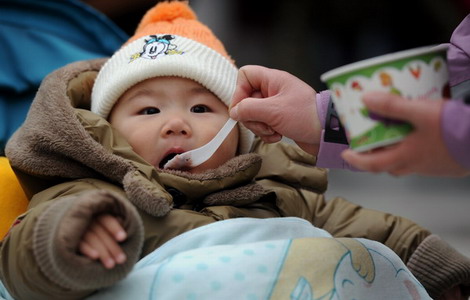China's PMI rebounds to 50.3% in Dec
Updated: 2012-01-01 10:13
(Xinhua)
|
|||||||||
BEIJING - China's December PMI data ceased its sliding trend for two consecutive months and ended 2011 with a slight rebound, delivering the hope of slow but steady growth in 2012, for the world's second-largest economy.
The Purchasing Managers' Index (PMI), a preliminary readout of the country's manufacturing activity, rebounded to 50.3 percent in December, indicating a stabler slowing trend for the country's economic growth.
The December Purchasing Managers' Index was up 1.3 percentage points from 49 percent in November, the China Federation of Logistics and Purchasing (CFLP) said Sunday.
A PMI reading of 50 percent demarcates expansion from contraction.
The CFLP's PMI is based on a survey of purchasing managers in more than 820 companies in 20 industries.
The preview of HSBC China's PMI for December rebounded slightly from November's 47.7 to 48.7 after adjusting for seasonal variation.
YEAR-ROUND GROWTH PERFORMS STEADY
The slight growth in the December PMI confirmed a stabler trend of cooling economic growth of which the impetus still appears weak. "The pace of the growth slowdown is unlikely to tumble in 2012," said Zhang Liqun, a researcher with the Development Research Center of the State Council, China's cabinet.
He said the fundamentals in the country's economic development remain unaltered, which creates chances of pulling back the growth trend.
Cai Jin, deputy director of CFLP, also said the sharply shrunk demand started climbing back, mirroring the slow but steady economic status.
"The fresh PMI data are beyond expectation," Cai explained, "New Year's Day and the Spring Festival boosted demand and the newly drawn central policy brought by the Central Economic Working Conference enhanced public confidence on macro control."
China's economic growth has been slowing throughout 2011, with its two largest trade partners, Europe and the United States, struggling for recovery from the global financial crisis and its aftermath.
The country's GDP rose 9.1 percent year-on-year in the third quarter of the year, slowing from 9.5 percent in the second quarter and 9.7 percent in the first quarter.
However, the slowdown seems to have contributed to the eased pressure on prices. The sub-index for purchase prices rose 2.7 percentage points from November to 47.1 percent in December.
The country's consumer price index (CPI), a main gauge of inflation, rose 5.5 percent year-on-year from January to November this year, peaking at 6.5 percent in July, a total well above the government's full-year inflation control target of 4 percent.
TWO FESTIVALS LURE FINAL REBOUND
Surging domestic and overseas consumption in December acted as the key to the rebound, thanks to the stimulation of New Year's Day and the Spring Festival, a golden period for consumption.
The CFLP's sub-index for new orders in December was 49.8 percent, up 2.0 percentage points from November.
In the meantime, exports performed better despite the lasting impact by the two disappointing trade partners.
The sub-index for export orders recovered 3 percentage points to 48.6 percent in December from November's sharp drop to 45.6 percent, suggesting that the impact of the spreading eurozone debt crisis eased, and the weakened demand gradually regained the former losses.
Cui Li, chief Chinese economist of Royal Bank of Scotland (RBS), said China's diversified trade partners are conducive to its exports.
For now, 40 percent of the country's total exports are to emerging markets, ensuring moderate export growth even when developed economies are mired in economic recovery, Cui said.
New export orders in the last five months, except September, performed lower than the demarcated 50 percent.
"Exports are unlikely to distinctly rebound in the short term considering the weary global economic situation," Cui said, "but impact on China's exports is weakening because of contraction in world trade."
In December, 12 industries, including petroleum refining and coking, apparel, shoes, fur and feather products manufacturing, agricultural food processing and food production, enjoyed a PMI over 50 percent, while sectors such as facility manufacturing, general equipment manufacturing, and industrial chemicals manufacturing registered under 50 percent.
GROWTH IN 2012 TO SPEED FROM SLOW
China's economic growth in 2012 is expected to start at a slow pace in the first quarter, but gradually move faster during the rest of the year. So, balancing the cooling economy and turbulent prices still is a priority.
The latest report of the Bank of China said the required reserve rate (RRR) is expected to be lowered, although the keynote of macro control in 2012 continues to maintain positive fiscal policy and prudent monetary policy.
Li Wei, economist of Standard Chartered, said the RRR maintained unchanged because the December PMI was beyond estimates, and the time to lower RRR is expected to approach after New Year's Day.
Cai suggested a moderate adjustment of monetary policy to increase citizens' income through tax cuts and adding subsidies. "Lower RRR does not mean loosen the monetary policy but an adjustment of the former tight monetary policy," he said.
Hot Topics
Kim Jong-il, Mengniu, train crash probe, Vaclav Havel, New Year, coast guard death, Internet security, Mekong River, Strait of Hormuz, economic work conference
Editor's Picks

|

|

|

|

|

|







